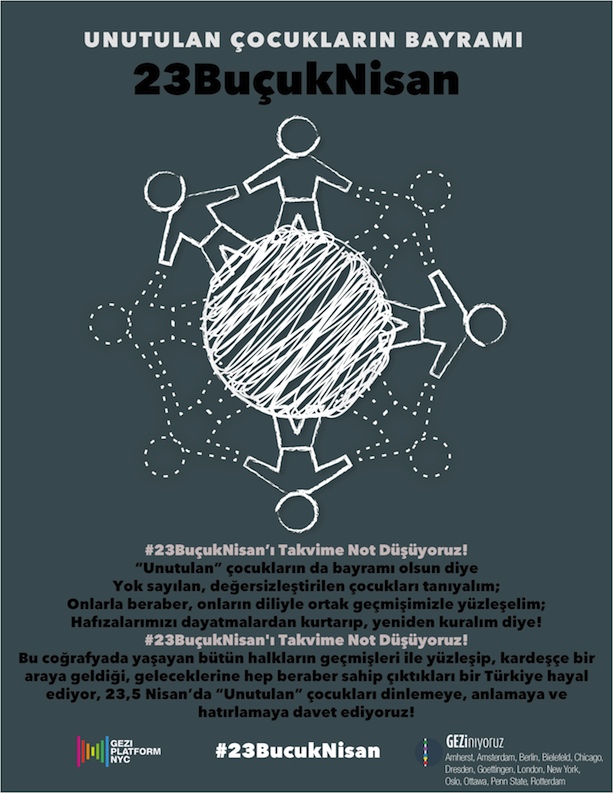#23BuçukNisan / Unutulan Çocukların Bayramı
[Bu bildiri New York City Gezi Platformu tarafından, GEZIniyoruz Amherst, Amsterdam, Berlin, Bielefeld, Chicago, Dresden, Goettingen, London, New York, Oslo, Ottawa, Penn State, Rotterdam ile beraber 23 Nisan 2014 tarihinde yayımlandı. / The following statement was published by Gezi Platform NYC, together with GEZIniyoruz Amherst, Amsterdam, Berlin, Bielefeld, Chicago, Dresden, Goettingen, London, New York, Oslo, Ottawa, Penn State, Rotterdam, on 23 April 2014.]
# April 23.5 / Forgotten Children`s Festival is a campaign initiated by the international solidarity platform GEZIniyoruz network and Gezi Platform NYC. The campaign aims to draw awareness to the tragedy of 24 April, the anniversary of the Armenian genocide, following the annual Children`s Day celebrations in Turkey in commemoration of the first parliament of the Republic. The campaign seeks to also underline the ongoing injustices children continue to face in Turkey, such as child labor, child marriages, ethic discrimination, political criminalization, and the imprisonment of children.
English
We mark #April23andahalf on our calendars
To acknowledge it as the day of "Forgotten" children
To recognize the children neglected and belittled,
To face our common past together in their own words,
To reconstitute our memory free from indoctrination.
We mark #April23andahalf on our calendars.
We dream of a Turkey where all peoples of this land recognize their past; unite as sisters and brothers, reclaiming their future. On April 23.5, we invite all to listen, understand and remember the "Forgotten" children.
The day of the "forgotten" children.
Turkish
#23BuçukNisan’ı Takvime Not Düşüyoruz!
Unutulan çocukların bayramı olsun diye
Yok sayılan, değersizleştirilen çocukları tanıyalım;
Onlarla beraber, onların diliyle ortak geçmişimizle yüzleşelim;
Hafızalarımızı dayatmalardan kurtarıp, yeniden kuralım diye!
#23BuçukNisan’ı Takvime Not Düşüyoruz!
Herkesin gözü önünde aile içi şiddete ve tacize maruz kalan, evlendirilen, doğum yapan, işçi olarak çalıştırılan; bu haksızlıklara isyan ettiği zaman devlet eliyle yaralanan ve öldürülen çocukların hesabını soralım diye!
#23BuçukNisan’ı Takvime Not Düşüyoruz!
Dili, dini, ve etnik kökeni nedeniyle dışlanan, asimile edilen, göçe zorlanan, işkence edilen, öldürülen ve soykırıma uğrayan yitirdiğimiz çocuklarımız ve çocukluklarımız için adalet talebinde bulunabilelim diye!
#23BuçukNisan’ı Takvime Not Düşüyoruz!
Toplumsal hafızamızdan silinmeye çalışılan eski güzel günleri de, kan ve ölüm dolu günleri de çocukluk anılarımızda beraberce yerlerine koyalım; acı ve sevinçleri ortak kılalım diye!
#23BuçukNisan’ı Takvime Not Düşüyoruz!
Çocuklarımız geleceklerini, yüzleşilmiş, hesabı sorulmuş, yaraları sarılmış bir geçmiş üzerine inşa edebilsin; tarihsiz çocuk kalmasın diye!
Tek bir ulusun, tek bir dinin, tek bir dilin değil, bu coğrafyada yaşayan bütün halkların kardeşçe birlikteliğinin kutlandığı bir Türkiye hayal ediyor, 23,5 Nisan’da “Unutulan” çocukları dinlemeye, anlamaya ve hatırlamaya davet ediyoruz!
Imza:
Gezi Platform NYC
GEZIniyoruz Amherst, Amsterdam, Berlin, Bielefeld, Chicago, Dresden, Goettingen, London, New York, Oslo, Ottawa, Penn State, Rotterdam
Kurdish
#em 23ûNîvê Avrêlê nîşe datînin dîrokê!
Ji bo bibe cejna zarokên hatine ji bîr kirin, zarokên tune hatine hesibandin, bê nirx hatine kirin;
bi wan re, bi zimanê wan, rû bi rû werin bi paşeroja xwe ya hevpar ve;
ji bo em bîrên xwe ji zorandina rizgar bikin, û ji nû ve ava bikin!
#em 23ûNîvê Avrêlê nîşe datînin dîrokê!
Ji bo em hesabê wan zarokên li ber çavên her kesî dûçarî şîdeta nav malê û tacîzê dimînin, tên zewicandin, zarokan tînin, weke karker tên xebitandin; dema dijî van bêmafiyan serê xwe hildidin bi destê dewletê tên kuştin û birîndar kirin bipirsin!
#em 23ûNîvê Avrêlê nîşe datînin dîrokê!
Ji bo zarokên me yên me wenda kir ji ber ziman, ol û ripinên etnîk hatin veder kirin, bişavtin, bi zorî koçkirin, îşkence kirin, kuştin û jenosîd kirin û bo em daxwaziya dadê ji bo zarokên xwe bikin!
#em 23ûNîvê Avrêlê nîşe datînin dîrokê!
Ji bo rojên berê yên xweş yên dixwazin ji bîra me ya civakî bibin jî, rojên bi xwîn û mirin tije jî, di bîranînên xwe de em bi hev re daynin cîh; êşan û şadiyan hevpar bikin!
#em 23ûNîvê Avrêlê nîşe datînin dîrokê!
Ji bo zarokên me pêşeroja xwe li ser paşerojeka hatiye rû bi rû bûn, hesabê wî hatiye pirsîn, birînên wî hatine pêçandin ava bikin; û zarokek bê dîrok nemîne!
Em Tirkîyeyek bi hevrebûna bi biratî ya giştî gelên li ser vê erdnıgariyé dîjin tê pîroz kirin xeyal dikin, di 23ûNivê Avrêlê de vexwendina guhdarî li zarokên "hatine ji bîr kirin" kirinê, fehm kirinê û bibîranînê dikin!
